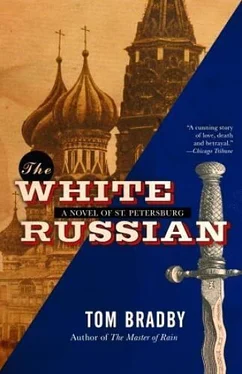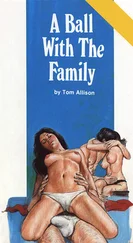“It was a warning. You were to be allowed to pursue the murder case-after all, Vasilyev more than anyone wished to know who was killing his men-but you were not to uncover the link between him and the revolutionaries. And in Yalta, you did. The bomb was an attempt to warn you off, but the young fool was incompetent and that’s why he nearly killed us.”
Pavel stared at him with mournful eyes.
“In your own way, you were trying to protect me,” Ruzsky said. “You thought that if you watched me and reported back all that we were doing, they’d have no need to dispose of me. Isn’t that the case?”
“Even if it was, it would not exonerate me.”
Ruzsky looked at his friend. “For Christ’s sake, you do not have to seek my forgiveness. What have I done that is of any benefit to anyone?”
“You have caused Vasilyev true discomfort.” Pavel examined his hands. “He wanted to find out who was killing his creatures, but he did not want you to know what they were doing.” He looked up. “He could not decide what to do with you.”
Ruzsky heard the hesitation and regret in Pavel’s voice and, when he looked up, saw it in his eyes. His heart sank.
Their friendship was destroyed and they both knew it. The consequences of this betrayal outran even a complete understanding of its motives. “I’m sorry,” Ruzsky said.
“I deserve no pity.”
“And should feel no shame. There is no one left to serve.”
Pavel did not answer.
“Each of us must find his own way through. I didn’t understand that before. I do now.” Ruzsky pulled back the blankets and forced himself upright. His head exploded with pain.
“If you try to interfere, they will kill you.”
“I have no choice.”
“It is too late. The gold is already being loaded at the Tsarskoe Selo Station. There is nothing you can do.”
“I cannot leave him. He is my brother.”
“If that is his destination, then all you will achieve is to die together.”
“But I cannot abandon him to his fate alone.” Ruzsky looked at his partner. “Do they know he is coming?”
Pavel shook his head.
“Will Maretsky tell them about the knife?”
“He would not help them.”
“I ask only for a chance, Pavel.”
The big detective straightened, his eyes never leaving Ruzsky’s own. “Of course, my friend. I will ask them to prepare a sled.”
A few minutes later, Ruzsky opened the door and stepped out into the night. A plain sled had been prepared, without the family’s livery. A servant was wrapped up in the driving seat and the horses shifted quietly in the wind. Pavel was waiting for him in the darkness.
Ruzsky climbed into the back, and looked into the face of his deputy.
“You are too late to reach the crossing,” he said. “Try to get onto the train.”
Ruzsky offered him his hand. Pavel took it cautiously. “Good luck, my friend,” he whispered. “There will be many of them.”
The sled pulled away.
As Ruzsky looked back, he saw that Pavel was still watching him, his big body framed by the light of the doorway.
O khrana men in long black overcoats had sealed off the Tsarskoe Selo Station, standing in a ring around its entrance in the darkness. It was still snowing heavily and Ruzsky ducked his head and walked past them toward Sadovaya Ulitsa.
He had left the sled some distance away and told the servant to return home.
Fifty yards on, Ruzsky stopped and looked back to check that he was out of sight.
He reached up for the wooden fence next to the road.
It took all his strength to lever himself over it and into a drift three or four feet deep that had gathered on the far side. For a moment, he was lost in the powder, small crystals of ice in his eyes and mouth and ears.
He stood and fought his way through, until he stumbled and fell onto an icy pathway.
He picked himself up and brushed the snow weakly from his clothes. There were no lights on in the two sheds ahead, but he could see sparks from a brazier spitting into the night sky.
The coal fire stood in a small clearing. Ruzsky hesitated for a moment, then moved forward to warm himself, standing so close that sparks gathered on his clothes.
He heard voices and slipped into the nearest shed. It was dark and smelled of oil and grease. Bits of machinery-winches, old signal posts, hammers, and wrenches-hung from the ceiling alongside rows of conductors’ flags. Ruzsky shut the door and waited until the men had passed. They were talking quietly to themselves, and he smelled the pungent aroma of their tobacco.
He took the Sauvage revolver from inside his jacket and checked that there was ammunition in its chambers. He wasn’t certain if it would still fire after being bathed in the frozen waters of the Neva, but he replaced it and stepped outside.
He walked to the far end of the shed and looked down toward the station.
The snout of an armored train, of the kind used to transport heavy fighting equipment to the front, poked out beyond the shelter of the glass and iron roof above the concourse. Across the track, through the snowstorm, Ruzsky could see a group of men standing guard.
Above the engine, the Tsar’s personal flag flapped in the wind.
To Ruzsky’s left, there was a large mound of discarded equipment covered in snow and he waded through another thick drift to reach it. He felt his body temperature plunging once more, his hands icy as he touched a discarded piece of track and clawed his way up it so that he had a view into the station concourse. He was close to the platform where he and Pavel had boarded the commuter train to Tsarskoe Selo.
Behind the huge black engine were four or five transport wagons with their doors open. Through a cloud of steam, Ruzsky could make out a series of figures on the platform. Four men wheeled a trolley down toward one of the transport wagons and unloaded its contents. The gold bars shimmered in the light of the gas lamps.
Ruzsky could make out Prokopiev, who stood several inches above the group of agents around him. The Okhrana deputy threw his cigarette out into the night and then he and two colleagues strolled toward the engine and climbed in.
Ruzsky watched the last of the gold being loaded up. One of the men got into the carriage and another slammed its door shut. The other two wheeled the trolley back toward the station entrance.
The engine wheezed and hissed. A cloud of steam curled around the corner of the roof and was lost in the swirling snow.
Ruzsky stood and caught sight of two guards, right in front of him, not ten yards away. He cursed silently and dropped back down, his heart pounding.
He raised his head slowly. The men had not seen him. They were also watching what was happening on the platform, smoking and talking to each other. They began to walk around to his right, blocking his departure.
There were a series of shouts. The engine let off a loud hiss of steam and then turned its wheels once, shunting the carriages forward.
More men appeared on the platform.
Prokopiev stuck his head out of the side of the engine and looked back at the carriages. “All right!” he called. “It’s ready!”
The train shunted forward once more, but still did not pull away.
The two guards stood between Ruzsky and the train.
The engine blew off another head of steam. Again it shunted forward and this time kept moving, its great iron wheels grinding their way along the track.
The guards watched its departure for a moment, then moved away.
Ruzsky edged forward. No one was visible at the rear of the train. The Okhrana men inside were behind closed doors and those in the armored engine had ducked down to avoid the blizzard.
The train began to gather speed. As the last transport carriage drew level, Ruzsky began to run. He slipped once, then picked himself up and waded through to the path. Out on the track, the snow drove hard into his face and mouth.
Читать дальше












